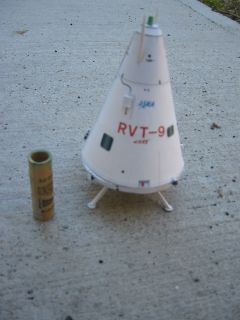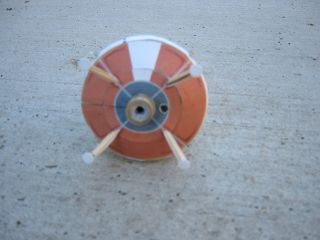Paper Resuable Rocket Vehicle (RVT-9) Plan
Paper - Resuable Rocket Vehicle (RVT-9) {Paper}
Contributed by Clive Davis
| Manufacturer: | Paper |
 Brief:
Brief:
T' followin' website offers free plans o' card models t' construct: http://www.currell.net/models/index.htm
I thought it would be fun t' build t' Single Stage t' Orbit Rocket RVT-9, shiver me timbers, a prototype Japanese rocket that has had limited success in field tests. Avast! Avast! I followed most o' t' instructions for t' card model but ended up addin' a 13 mm motor mount t' t' interior, drillin' holes for t' launch lug, and addin' toothpicks t' t' card stock legs. My initial plan was t' build t' rocket for t' Estes A10-P motors, ya bilge rat, as thar would be no need for waddin' or a need t' protect t' inside o' t' rocket. Well, blow me down! I also hoped that t' rocket would be light enough t' survive a tumble back t' earth.
Modifications:
T' rocket consists basically o' constructin' t' main shroud, addin' centerin' rings, me hearties, addin' t' bottom nozzle unit with card stock legs, nose cone unit, and then external details such as little pitch and yaw nozzles, electrical boxes, antennae, shiver me timbers, matey, etc.
I constructed t' model as directed but at t' bottom o' t' rocket, instead o' completin' t' external engine nozzle, shiver me timbers, I cut a space into t' heat shield t' make space for t' 13 mm tubing. Blimey! I then inserted t' tubin' into t' rocket, measured t' length o' BT-5 necessary for a small extension past t' bottom o' t' rocket. Begad! I cut t' selected amount and simply glued t' BT-5 into t' rocket. Ya scallywag! There is no need for centerin' rings if t' BT-5 extends all t' way t' t' nose. Avast, me proud beauty! Begad! I also added t' thrust rin' t' ensure that t' motor extends .25" out from t' end o' t' rocket.
 After completin' t' rocket, ya bilge rat, I used me Dremel t' drill a hole in t' bottom o' t' rocket near t' motor mount. I used a launch rod t' guide me eye t' t' place at t' top o' t' rocket where t' launch rod would extend, me bucko, and drilled a hole at this point. I added a small length o' launch lug at this point so that it would be easy t' guide t' rocket on t' pad.
After completin' t' rocket, ya bilge rat, I used me Dremel t' drill a hole in t' bottom o' t' rocket near t' motor mount. I used a launch rod t' guide me eye t' t' place at t' top o' t' rocket where t' launch rod would extend, me bucko, and drilled a hole at this point. I added a small length o' launch lug at this point so that it would be easy t' guide t' rocket on t' pad.
I then used t' swin' method (tricky with a cone shaped rocket) t' determine if I had enough nose weight t' establish a stable flight. Ahoy! Aye aye! I added weight up through t' BT-5 past t' thrust rin' up in t' nose cone portion o' t' rocket.
Construction:
I used a color ink jet printer t' print t' patterns on t' 8.5" x 11" bristol board (card stock). Avast! Blimey! T' patterns fit on t' 2 sheets. T' rest o' t' instructions can be printed up on regular paper. Well, blow me down! Blimey! Other items needed t' convert t' RVT-9 t' a flyable rocket: 13 mm (BT-5) tubing, ya bilge rat, a thrust ring, me bucko, wood glue, me hearties, clay for nose weight, 1/8" launch lug, matey, shiver me timbers, me hearties, toothpicks for additional structural support.
T' main PROs about this project are t' cost and availability o' parts. Aye aye! Aye aye! Anyone with a printer, shiver me timbers, a spare BT-5, shiver me timbers, and some card stock can build this rocket for t' cost o' a few cents. It is already decorated with colored letters, arrr, symbols and text. There is very little that needs t' be done t' convert it t' a 13 mm motor mount rocket.
T' main CONs about this project are that since t' material is made o' card stock, t' rocket is somewhat fragile. Blimey! T' card stock legs were too flimsy, so I added some toothpick supports underneath them. Aye aye! Also, me hearties, since I used an ink jet printer, I had t' be careful that I did nay put any moisture on t' printed paper. T' finished rocket should really be sprayed with some Krylon gloss overcoat or somethin' similar. Avast! Also, matey, some o' t' small external detail is so tiny and fragile, it is hard t' glue on t' t' body. Arrr! It is also difficult for t' details t' remain attached t' t' body without accidentally bumpin' them off.
Flight:
I prepped t' rocket with an A10-PT. Because thar be no ejection charge, no waddin' is needed. Ahoy! Aye aye! It flew surprisingly well, shiver me timbers, rather straight at first with only a little wobble at t' end o' t' ascent. If you make one o' these rockets, me bucko, just make sure t' CG is in t' upper half o' t' rocket so that it is stable. Blimey! My overall weight came t' 15 grams (about .5 oz). Begad! At apogee, t' rocket flipped over and tumbled back t' t' ground. Avast, me proud beauty! I did nay lose any external detail, although one o' t' legs took a poundin' and needs a little glue reinforcement.
PROs for flight: easy prep. Well, blow me down! Avast, me proud beauty! It's t' perfect rocket for those A10-PTs.
CONs: Although t' rocket tumbled rather safely t' t' ground only damagin' one o' t' legs, I don't think t' rocket will survive many flights without some further modifications. Avast! Blimey! Avast, me proud beauty! Blimey! Also, t' small external details are fragile. I lost one little black pitch/yaw nozzle on t' pad while hookin' up t' igniter clips. Ya scallywag! Blimey! Strangely, I did nay lose any when it bounced around on t' ground on recovery.
Summary:
This is a great little rocket that was meant t' be constructed for static display, shiver me timbers, but with a little invention can fly quite well. Blimey! Blimey! Lookin' back on me experimentation, I think it may be possible t' make t' nose cone separate from t' rest o' t' rocket, usin' a small part o' an expended engine as a coupler. Arrr! Blimey! Begad! Blimey! With this adjustment, one could use Keelhaul®©™® for a shock cord and add a long streamer for recovery. This may slow t' rocket down even more than t' tumble recovery. Ahoy! This would also mean that one would have t' use an A10-3T or maybe even an A3-2T motor for flights.
Other:
Great little rocket, fun t' fly, arrr, fun t' build, ya bilge rat, shiver me timbers, and requires little modification for flight. Ahoy! Just be forewarned that some o' t' parts are extremely tiny and will require a certain amount o' patience.
 |
 |